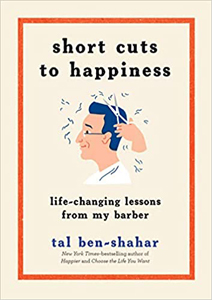 Tal Ben-Shahar, Short Cuts to Happiness: Life-Changing Lessons from My Barber (New York: The Experiment, 2018), 160pp.
Tal Ben-Shahar, Short Cuts to Happiness: Life-Changing Lessons from My Barber (New York: The Experiment, 2018), 160pp.
I felt a little silly reviewing a book like this, until I noticed the background of the author. Tal Ben-Shahar (born 1970) earned his BA and PhD at Harvard in Organizational Behavior, where he taught two of the largest classes ever in Harvard’s history, Positive Psychology and The Psychology of Leadership. He's been called a "happiness expert" and a "social psychologist." For the last fifteen years he has taught leadership, happiness, and mindfulness all over the world, and his five previous books have been translated into twenty-five languages. Clearly, many people are still searching for that elusive elixir: what is happiness and how do I get it?
From 2014 to 2016 Ben-Shahar took notes every time he went to his barber in Tel Aviv. This book with its 40 "chapters" is the result. I read it in one sitting, but it would also be useful to take in very small bites, like a chapter a day. Each chapter is about three pages long, and follows the same format. He first recalls his conversations with his barber, and then he relates those conversations to a broad array of mainstream intellectuals, scientific studies, etc., from Socrates and Aristotle, to Durkheim, Voltaire, Maimonides, Mark Twain and John Donne.
The book is about what I expected, but I was still glad I read it. In Ben-Shahar's words, the wisdom he gleans from his barber is really about "common sense solutions to our universal human problems." Gratitude is important. Live in the present, not in the future. Less can be more. Adversity can help us grow. Be open to change. These observations might be obvious, but they also bear repeating.
This book reminded me of a more "scientific" but similar one by Karl Pillemer, 30 Lessons for Living; Tried and True Advice from the Wisest Americans (2011). Pillemer is a professor of human development at Cornell University who specializes in gerontology and founded the Cornell Institute for Translational Research on Aging. His book presents the results of a study in which Pillemer studied a thousand elderly people across five years, conducting over 10,000 interviews of various types. He then organized their insights into six major themes, with five life lessons for each theme: marriage, work, parenting, aging, living without regret, and happiness.
These sorts of popular books might not "change your life" like Ben-Shahar's subtitle promises, but they can still be helpful in reminding us about what matters most.
Dan Clendenin: dan@journeywithjesus.net


